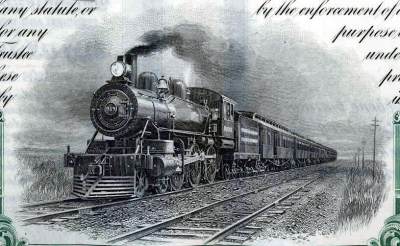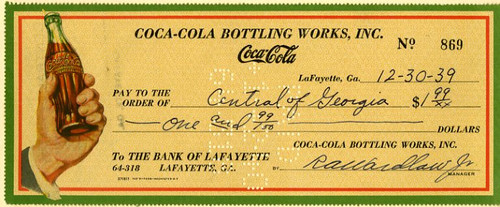Beautifully engraved certificate from the Winston-Salem Southbound Railway issued no later than 1927. This historic document was printed by the American Banknote Company and has an ornate border around it with a vignette of a train. This item is hand signed by the Company's President and Secretary and is over 78 years old. 
Certificate Vignette The Winston-Salem Southbound Railway Co. operates from Winston-Salem through Lexington and Albemarle to Wadesboro, serving industries in the central Piedmont counties of Forsyth, Davidson, Stanly, and Anson. Incorporated in 1905, the company began service in 1910. While the company is independently operated, all of its stock is owned jointly by CSX and Norfolk Southern. Commodities carried by the railroad are grain, sand, gravel, stone, forest products, paper products, coal, coke, cement, clay fertilizer, aluminum, chemicals, iron, and steel. Principal shippers are: Corn Products Co. of Winston-Salem manufacturer of corn syrup and related products; and Owens Brockway Glass Co. of Eller manufacturer of glass products. The Winston-Salem Southbound connects with four railroads: Norfolk Southern; CSX; High Point, Thomasville & Denton; and Aberdeen, Carolina & Western. ---------------------------------------------------------------------------- Gold Bonds Many times Bonds were Payable in Gold or Gold Coin to give the impression that they were a more secure investment. In reality, they were not more secure since there wasn't any gold set aside as collateral for these bonds. On April 5, 1933, President Franklin D. Roosevelt signed Presidential Executive Order 6102 which invoked his authority to make it unlawful to own or hold gold coins, gold bullion, or gold certificates. The export of Gold for purposes of payment was also outlawed, except under license from the Treasury. On January 30, 1934, the Gold Reserve Act became law which made the ownership of gold illegal except for coins of numismatic value. As a result of this law, Bonds were no longer allowed to be Payable in Gold.

Certificate Vignette








